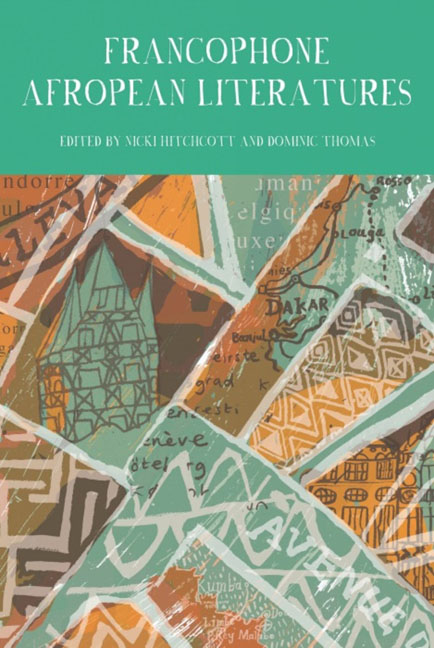Book contents
- Frontmatter
- Contents
- Introduction: Francophone Afropeans
- Essays
- Afropeanism and Francophone Sub-saharan African Writing
- The Transatlantic Poetics of Fatou Diome
- Corps Sans Titre: ‘Fleshiness’ and Afropean Identity in Bessora's 53 Cm
- Already Here: Sami Tchak's Afropean Generation
- Paris Polar: Afropean Noir in the City of Light
- Mapping Afropea: The Translation of Black Paris in the Fiction of Alain Mabanckou
- Relighting Stars and Bazaars of Voices: Exchange and Dialogue in Leonora Mianos Tels Des astres eteints and Alain Mabanckous Black Bazar
- Sex and the Afropean City: Léonora Miano's Blues Pour Élise
- Towards an Afropean Cosmopolitanism: Hospitality, Friendship and the African Immigrant
- Afropean Masculinities as bricolage
- Short Stories
- Notes on Contributors
- Index
Paris Polar: Afropean Noir in the City of Light
from Essays
- Frontmatter
- Contents
- Introduction: Francophone Afropeans
- Essays
- Afropeanism and Francophone Sub-saharan African Writing
- The Transatlantic Poetics of Fatou Diome
- Corps Sans Titre: ‘Fleshiness’ and Afropean Identity in Bessora's 53 Cm
- Already Here: Sami Tchak's Afropean Generation
- Paris Polar: Afropean Noir in the City of Light
- Mapping Afropea: The Translation of Black Paris in the Fiction of Alain Mabanckou
- Relighting Stars and Bazaars of Voices: Exchange and Dialogue in Leonora Mianos Tels Des astres eteints and Alain Mabanckous Black Bazar
- Sex and the Afropean City: Léonora Miano's Blues Pour Élise
- Towards an Afropean Cosmopolitanism: Hospitality, Friendship and the African Immigrant
- Afropean Masculinities as bricolage
- Short Stories
- Notes on Contributors
- Index
Summary
Among the myriad forms of artistic production emerging from the post–independence encounters between African and European cultures is a unique iteration of noir fiction. With its inherent attention to moral justice and discounted existences, noir presents a particularly intriguing instance of Afropeanism, foregrounding the recalibration of ethical systems and social hierarchies that accompany the shifting conceptions of European and other, of insider and outsider. Jean–Roger Essomba's 2010 novel Alerte à la bonté [Kindness Threat] is a semi–fantastical noir narrative that reflects these important intersections between the genre and ongoing renegotiations of local, national and global affiliations. But the work also sketches out new ground in francophone African crime fiction in that it teases out the potential points of friction between the genre and Afropean experience. In particular, as I will discuss here, Essomba exploits the longstanding affiliation of noir with urban space in order to suggest a critique of the ways in which colonial geographies persistently manifest themselves in the Parisian cityscape. Read in dialogue with the author's earlier narratives of Afropean migration, Alerte à la bonté ultimately posits the representative limits of noir as a means of examining twenty–first–century configurations of urbanism and transnationalism in the city of light.
Like most genres, noir eludes easy definition, but criticism on the genre tends to focus on its symptomatic and critical function as a commentary on contemporary political and social context (see Conard, 2006: 1–2, 7–22; Naremore, 1998). Noir figures as a sign of its times, offering a wide spectrum of positions on its contemporaneous moment, from the conservative impulse towards order and conformity in works of detective fiction to the subversive possibilities of exploring and celebrating the nonconformity of the noir world. In the Anglo–American context that is considered its birthplace, for example, crime fiction has been studied as a key to the British imperial project and as an expression of US anxieties concerning capitalism, the atomic age, race relations and gender. In France, interest in the genre intensified in the years following the Second World War, reflecting, as Claire Gorrara (2009) notes, shifting conceptions of criminality and violence on both individual and collective scales.
- Type
- Chapter
- Information
- Francophone Afropean Literatures , pp. 81 - 94Publisher: Liverpool University PressPrint publication year: 2014

